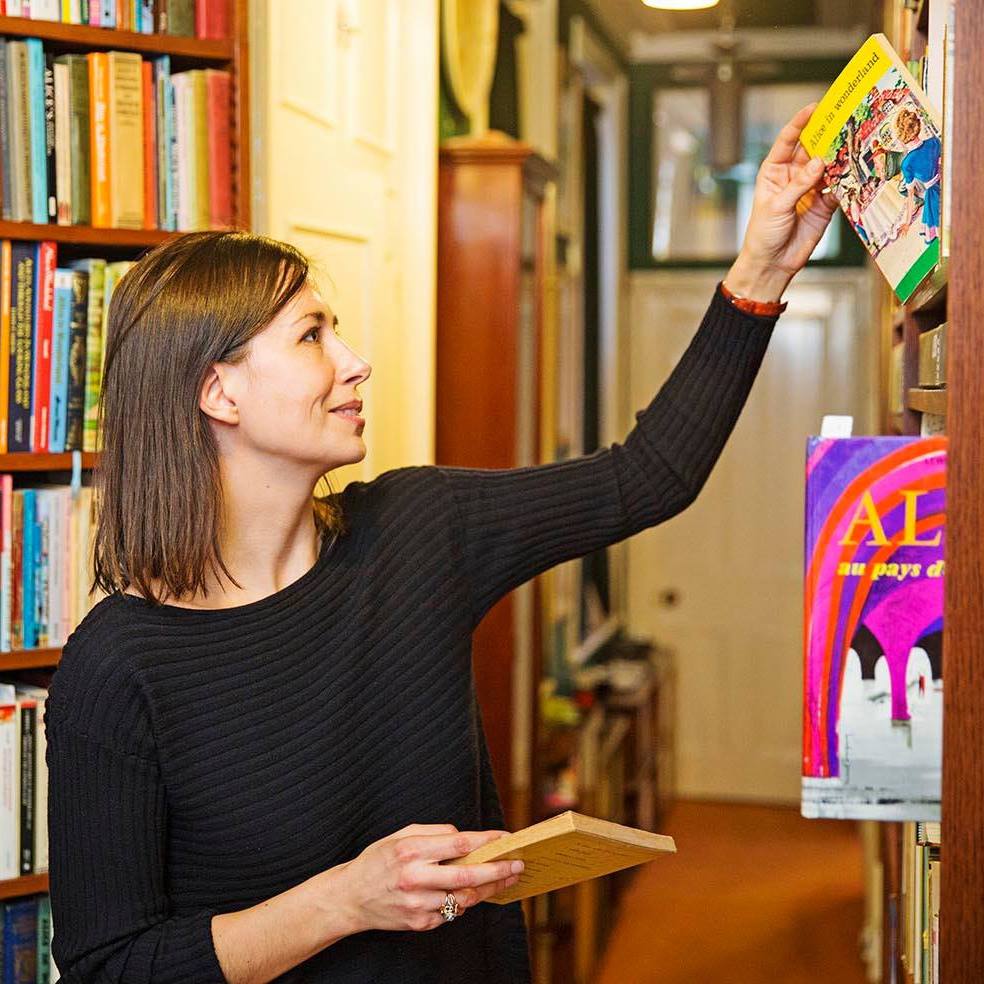Study options
- Starting in
- September 2025
- Location
- Mile End
- Fees
- Home: £12,250
Overseas: £25,500
EU/EEA/Swiss students
What you'll study
The MA in Translation and Adaptation Studies offers a comprehensive programme for students to explore a broad range of theories and practices within these two distinct but related fields. Its combined focus on translation and adaptation – unique within the UK – widens the scope of Translation Studies to address movement not only between languages but also between different media, creating an opportunity for innovative work within these fields. It is also a thoroughly global programme: the teaching staff, which includes prizewinning translators, offer expertise in theories and practices of translation from all over the world, including China and the Middle East, and linguistic expertise in Arabic and Chinese as well as Catalan, Dutch/Flemish, French, German, Hebrew, Italian, Polish, Portuguese, Romanian, Russian, and Spanish. Depending on staff availability, we may additionally offer linguistic expertise in Hindi and Urdu.
At the heart of the programme are three compulsory elements: a module which introduces students to modern translation theory, from linguistic approaches to recent postcolonial critiques; a module to introduce them to the theory and practice of Adaptation; and a dissertation, constituting either a research thesis or an extended translation/adaptation and commentary. Beyond these elements, the programme is distinguished by its flexibility, offering pathways for students based on their expertise and career goals. Those interested primarily in translation, for instance, might supplement the compulsory modules with an option in translation and literary theory. Those who have a second language to an advanced standard may also choose the option in practical Translation Skills, in which students can build a portfolio of their own translation work. Similarly, for those more drawn to adaptation, an applied module in adaptation through scriptwriting is available.
Structure
Semester One – Two core modules (60 credits total) Core module: Translation Theory I: Theories, Problems, Terms (30 credits) This module explores the major concepts, theories, and debates that structure the modern field of Translation Studies. It introduces students to a broad range of research within translation studies, from linguistics-informed approaches to critical explorations of the ethics and politics of translation practice. In keeping with the global emphasis of the MA programme, students will explore translation theory from the Global South in addition to the classic texts of the Anglo-European canon.
Core module: Adaptation in Theory and Practice (30 credits) This module begins with an examination of theories of adaptation in relation to translation studies before moving on to explore the adaptations of a series of classic works on the page, stage and screen. Encompassing forms and media such as ballet, photography, film and television alongside literature, the module will focus on the ways in which adaptations target new audiences and address the cultural values of their source texts in the light of current sensibilities in relation to race and gender.
Further options to be added as necessary, and students may also choose an option from other MA programmes within the Faculty, for instance in Linguistics or Film. Semester Two – students choose two modules (60 credits total) Optional module: Translation Theory II: Translation, Empire, and Law (30 credits) invites students to investigate the place of translation in systems of law and governance, particularly in colonial and postcolonial contexts. Structured around five key concepts - empire, law, violence, resistance, and justice - it delves deeply into their definitions and implications through readings of key texts in translation history and in postcolonial and critical theory, as well as select literary and legal texts in translation.
Optional module: Practical Translation Skills (30 credits) This module equips students with the skills and experience needed for practical and professional translation. Through readings, discussions, and translation workshops, students will develop techniques for translating across a range of literary and technical genres, building a portfolio of polished original translations which can be used in professional contexts. They will also be guided through the process of submitting work for competitions and for publication.
Optional module: Screenwriting: Prose to Film (30 credits) This module offers practice in adapting prose writing to film screenplay. It is a creative writing module and adaptations will be written based on a range of story sources. Workshops, readings and screenings will support the understanding of story development and practices for adaptation.
Translation and Adaptation Studies Dissertation (60 credits) Either: 10,000-word MA research dissertation within the field of Translation and Adaptation Studies, Or: A 10,000-word (total) translation or adaptation of a chosen text, accompanied by a critical commentary (included in word count)
Compulsory/Core modules
Translation Studies I: Problems, Theories, Terms explores the major concepts, theories, and debates that structure the modern field of Translation Studies. It introduces students to a broad range of research within translation studies, from linguistics-informed approaches to critical explorations of the ethics and politics of translation practice. In keeping with the global emphasis of the MA programme, students will explore translation theory from the Global South in addition to the classic texts of the Anglo-European canon.
This module begins with an examination of theories of adaptation in relation to translation studies before moving on to explore the adaptations of a series of classic works on the page, stage and screen. Encompassing forms and media such as ballet, photography, film and television alongside literature, the module will focus on the ways in which adaptations target new audiences and address the cultural values of their source texts in the light of current sensibilities in relation to race and gender.
Compulsory/Core Elective modules
In coordination with a supervisor, students will select a research topic for advanced study. They will collect and analyse literary and cultural texts and theoretical materials.. They will produce a 10,000 word dissertation that synthesizes various aspects of the knowledge they have obtained throughout the degree and demonstrates their ability to conduct and present high-quality research.
In coordination with a supervisor, students will select a text to translate or adapt, and provide a commentary. Students will choose a text from any literary or cultural genre and translate it into a second language, or adapt it into another form. Building on practical translation and adaptation skills gained in earlier modules, as well as research and linguistic skills developed throughout the programme, they will produce a precise, creative translation/adaptation and accompanying critical commentary on the text. The word count is divided roughly equally between translation and commentary.
Elective modules
This module equips students with the skills and experience needed for practical and professional translation. Through readings, discussions, and translation workshops, students will develop techniques for translating across a range of literary and technical genres, building a portfolio of polished original translations which can be used in professional contexts. They will also be guided through the process of submitting work for competitions and for publication.
Assessment
- 67%% Modules
- 33%%
Teaching
Our teaching staff includes prizewinning translators and offer expertise in theories and practices of translation from all over the world, including China and the Middle East, and linguistic expertise in Arabic and Chinese as well as Catalan, Dutch/Flemish, French, German, Hebrew, Italian, Polish, Portuguese, Romanian, Russian, and Spanish. Depending on staff availability, we may additionally offer linguistic expertise in Hindi and Urdu.
Where you'll learn
Facilities
- Access to University of London’s libraries, including Senate House
- BLOC arts centre in ArtsOne Building featuring a state-of-the-art cinema
- Our Graduate Centre: purpose-built study spaces and a roof-top common room with a terrace
- Access to Queen Mary's libraries on all our campuses
- Access to a wide range of online resources (including journals, books, databases and media)
About the School
School of the Arts
The School of the Arts combines innovation, discovery and excellence in education and research in Drama, Film, Modern Languages, English & Comparative Literature, Creative Writing, Linguistics and Liberal Arts. We rank in the top 100 worldwide for Arts and Humanities (QS World University Rankings by Subject 2024)
With our commitment to social justice, inclusivity and social mobility, our collaborations with external organisations, prominent writers and performers, and our facilities that support both academic and practice-based learning, an education in the School of the Arts equips our students with critical thinking and practical skills, unleashes their imagination and enables them to reach the levels of excellence needed in today’s industries.
We regularly host prominent writers and performers and collaborate with leading organisations such as the V&A, the Barbican, the Live Art Development Agency and Shakespeare’s Globe.
We are renowned for the depth and impact of research - which leads our teaching. We rank 1st for drama and in the top 10 for film in the UK for the quality of our research (REF2021). Our multilingual community brings together brilliant minds from across the world to share a wealth of expertise combining research excellence with an unrivalled commitment to social justice and social mobility.
Career paths
This unique MA programme is designed to welcome students interested in both the academic and creative elements of Translation and Adaptation Studies. The training it provides in both academic and vocational skills will prepare students for successful careers not only in literary, academic and professional translation but also in creative and professional fields from media and publishing to finance, PR, the arts, education, and academia.
Fees and funding
Full-time study
September 2025 | 1 year
- Home: £12,250
- Overseas: £25,500
EU/EEA/Swiss students
Unconditional deposit
Home: Not applicable
Overseas: £2000
Information about deposits
Queen Mary alumni can get a £1000, 10% or 20% discount on their fees depending on the programme of study. Find out more about the Alumni Loyalty Award
Funding
There are a number of ways you can fund your postgraduate degree.
- Scholarships and bursaries
- Postgraduate loans (UK students)
- Country-specific scholarships for international students
Our Advice and Counselling service offers specialist support on financial issues, which you can access as soon as you apply for a place at Queen Mary. Before you apply, you can access our funding guides and advice on managing your money:
Entry requirements
UK
Degree requirements
A 2:1 or above at undergraduate level in in a Humanities or Social Sciences subject.
Find out more about how to apply for our postgraduate taught courses.
International
English language requirements
The English language requirements for our programmes are indicated by English bands, and therefore the specific test and score acceptable is based on the band assigned to the academic department within which your chosen course of study is administered. Note that for some academic departments there are programmes with non-standard English language requirements.
The English Language requirements for entry to postgraduate taught and research programmes in the School of the Arts fall within the following English band:
Band 5: IELTS (Academic) minimum score 7.0 overall with 6.0 in each of Writing, Listening, Reading and Speaking
We accept a range of English tests and qualifications categorised in our English bands for you to demonstrate your level of English Language proficiency. See all accepted English tests that we deem equivalent to these IELTS scores.
Visas and immigration
Find out how to apply for a student visa.





